
The Green Party of Minnesota is a green political party in the U.S. state of Minnesota. It is affiliated with the Green Party of the United States.

Raymond Thomas Rybak Jr. is an American politician, journalist, businessman, and activist who served from 2002 to 2014 as the 46th mayor of Minneapolis. In 2001, Rybak, endorsed by the Minneapolis Police Federation, defeated incumbent mayor Sharon Sayles Belton by a margin of 65% to 35%, the widest margin of victory over an incumbent mayor in city history. He took office in January 2002, and was reelected in 2005 and 2009. In December 2012, he announced that he would not run for another term and would concentrate on his family. Rybak called being mayor his "dream job".

The 2005 Minneapolis municipal elections in the U.S. state of Minnesota held a scheduled primary election on 13 September and a general election on 8 November. Voters in the city elected:

The city of Vancouver, along with the rest of British Columbia's municipalities, held its municipal elections on November 19, 2005. Canadian citizens who were over 18 years of age at the time of the vote, and had been a resident of Vancouver for the past 30 days and a resident of BC for the past six months, were able to vote for candidates in four races that were presented on one ballot. In addition, Canadian citizen non-resident property owners were eligible to vote.

Vision Vancouver is a green liberal municipal political party in Vancouver, British Columbia, Canada. Vision was formed in the months leading up to the 2005 municipal election.
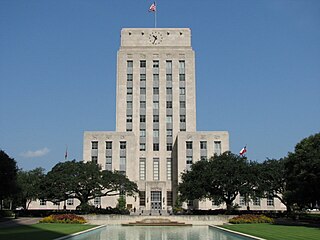
The politics of Houston in the U.S. state of Texas are complex and constantly shifting in part because the city is one of the fastest growing major cities in the United States and is the largest without zoning laws. Houston was founded in 1836 and incorporated in 1837. The city is the county seat of Harris County. A portion of southwest Houston extends into Fort Bend County and a small portion in the northeast extends into Montgomery County.
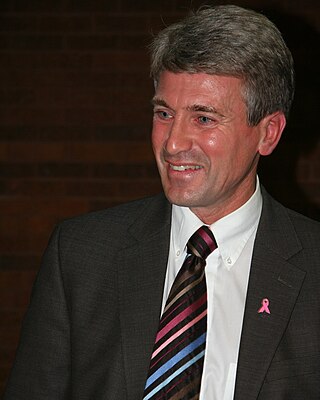
The 2009 Minneapolis mayoral election was held on November 3, 2009, to elect the Mayor of Minneapolis for a four-year term. Incumbent R. T. Rybak won re-election for a third term in the first round with 73.6% of the vote.

Elizabeth A.Hodges is an American politician who served as the 47th Mayor of Minneapolis from 2014 to 2018. A member of the Minnesota Democratic–Farmer–Labor Party (DFL), she represented Ward 13 on the Minneapolis City Council from 2006 January 2014.

The 2013 Minneapolis mayoral election was held on November 5, 2013, to elect the mayor of Minneapolis for a four-year term. This was the second mayoral election in the city's history to use instant-runoff voting, popularly known as ranked choice voting, first implemented in the city's 2009 elections. Municipal elections in Minnesota are nonpartisan, although candidates are able to identify with a political party on the ballot. After incumbent Mayor R. T. Rybak announced in late 2012 that he would not seek a fourth term, 35 candidates began campaigns to replace him. Many of these candidates sought the endorsement of the Minneapolis unit of the Minnesota Democratic–Farmer–Labor Party (DFL), though the convention ultimately ended with no endorsement.
The city of Vancouver, Canada, held municipal elections on November 20, 1999. Canadian citizens who were over 18 years of age at the time of the vote, and had been a resident of Vancouver for the previous 30 days and a resident of B.C. for the previous six months, were able to vote for candidates in four races that were presented on one ballot.
A general election was held in Minneapolis on November 5, 2013. Minneapolis's mayor was up for election as well as all the seats on the City Council, the two elected seats on the Board of Estimate and Taxation, and all the seats on the Park and Recreation Board. Voters were able to rank up to three candidates for each office in order of preference.

John M. Quincy is an American politician and marketing consultant living in Minneapolis. From 2010–2018, he served two terms on the Minneapolis City Council as a representative of the city's 11th Ward. Quincy moved to Minneapolis in 1994 and sought the endorsement of the Minnesota Democratic–Farmer–Labor Party (DFL) in 2006 for a seat on the Minneapolis Board of Education which he did not receive. He won both the DFL's endorsement and the 2009 City Council election and served as the head of several committees. He has also acted as a member of the Minneapolis–Saint Paul International Airport's Noise Oversight Committee.
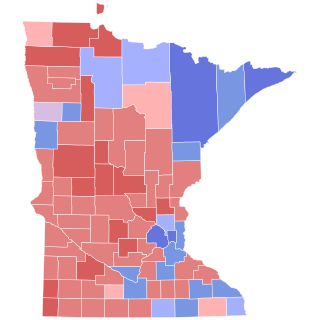
The 2018 Minnesota gubernatorial election took place on November 6, to elect the 41st Governor of Minnesota as incumbent Democratic (DFL) Governor Mark Dayton chose not to run for re-election for a third term. The Democratic nominee was U.S. Representative Tim Walz from Minnesota's 1st congressional district while the Republican Party nominated Hennepin County commissioner Jeff Johnson for a second consecutive time. The Independence Party of Minnesota did not field a candidate for the first time since 1994. Going into the election polls showed Walz ahead; the race was characterized as lean or likely DFL.

The 2017 Minneapolis mayoral election was held on November 7, 2017, to elect the Mayor of Minneapolis. This was the third mayoral election in the city's history to use ranked-choice voting. Municipal elections in Minnesota are nonpartisan, although candidates were able to identify with a political party on the ballot.
A general election was held in Minneapolis on November 7, 2017. Minneapolis's mayor was up for election as well as all the seats on the City Council, the two elected seats on the Board of Estimate and Taxation, and all the seats on the Park and Recreation Board. Voters were able to rank up to three candidates for each office in order of preference.
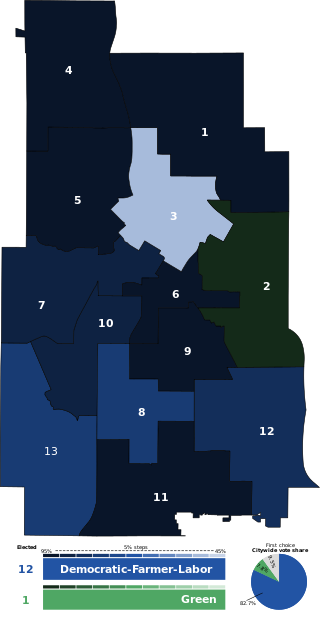
The 2017 Minneapolis City Council election was held on November 7, 2017, to elect the members of the Minneapolis City Council. The political composition remained unchanged, with the Minnesota Democratic–Farmer–Labor Party (DFL) retaining 12 seats and the Green Party of Minnesota one seat. Three DFL incumbents were defeated by intraparty opponents. The new City Council convened on January 8, 2018.
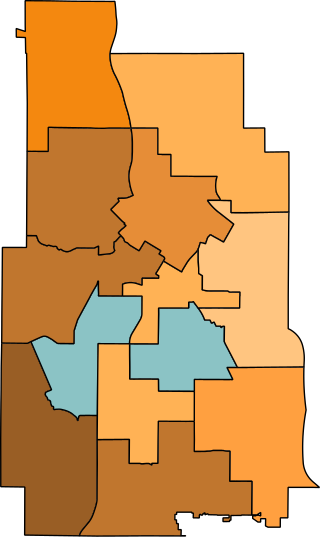
A mayoral election was held on November 2, 2021, to elect the mayor of the U.S. city of Minneapolis. Incumbent DFL mayor Jacob Frey won reelection to a second term, becoming the first Minneapolis mayor to win a second term since R. T. Rybak in 2005. Minneapolis mayoral elections use instant-runoff voting, also known as ranked-choice voting. All candidates appear on the same ballot and there is no primary election, nor is there a runoff. Minneapolis's twin city, Saint Paul, also held a mayoral election on the same day, using the same system.

The 2021 Minneapolis City Council elections was held on November 2, 2021, to elect representatives for all 13 wards of the Minneapolis City Council. These elections occurred alongside the mayoral race and several other municipal offices, including Park Board and Board of Estimate and Taxation positions. The council elections were conducted using a ranked-choice voting system, which allows voters to rank candidates by preference on their ballots.
A general election was held in Minneapolis on November 2, 2021. Minneapolis's mayor was up for election as well as all the seats on the City Council, the two elected seats on the Board of Estimate and Taxation, and all the seats on the Park and Recreation Board. Voters were able to rank up to three candidates for each office in order of preference. Additionally, there were three ballot measures on the ballot related to government structure, public safety, and rent control.

The 2023 Minneapolis City Council election took place in the city of Minneapolis, Minnesota, United States on November 7, 2023. The Minneapolis City Council is made up of 13 members serving four-year terms, with one council member representing each of the city's 13 wards. The 2023 election was the first election since the city's form of government moved to an Executive Mayor-Legislative Council structure. The change was prompted after voters narrowly approved a ballot measure in 2021 to shift certain powers from the city council to the mayor. Topics surrounding public safety, affordable housing, rent control, and racial justice were at the forefront of the campaign.
















